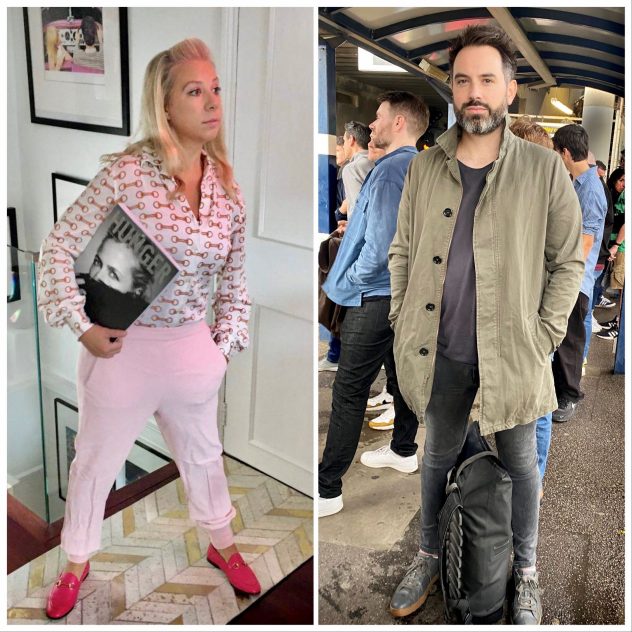Ahead of our next Introduction to Branding course run by the brilliant team at Anon Agency, we caught up with Founders Anna Tsekouras and Pete Austin to find out more about what branding really is.

Anna Tsekouras and Pete Austin, Founders of Anon Agency and Tutors on City’s Introduction to Marketing Short Course
- Can you describe what branding is?
It might sound crazy but that’s a tough question! Technically, in terms of the textbook definition, it’s the way you identify your product, service or company which sets you apart from your competitors. But in reality, it’s about much more than that. It’s more than what you can just see – it’s not just your logo, colours and font! Your brand comprises a set of personality attributes, values and beliefs that engage your audience who share those same values. Your brand might stand for body positivity, environmental sustainability or simply be about living luxuriously. Whatever it is, your brand is just like a human personality and its attributes will tell your audience who you are. How does my brand act when they go to a party? What does my brand talk to its friends about? What excites my brand? What scares my brand? Getting to know and defining your brand is integral to your success. A clear and confident brand builds trust and increases your business value.
- Why do you think an understanding of branding is so important for start-ups and SMEs?

Growing concerns, photo courtesy of Wilhelm Gunkel
Brand underpins everything you do; your Vision and Mission define why your brand exists, and who you want to reach. That relationship is integral to the success of a brand. If you don’t know who you are, what you stand for and what you believe in; then your audience won’t connect with your brand. And we all know the immense level of competition out there at the moment – now more than ever with small businesses booming since lockdown – so to get a competitive edge is vital.
Branding allows you to build relationships with your audience, which can turn them into loyal customers. The customer journey is a complex thing. But one thing that remains consistent, is the impact of a good brand in the process. Whether the customer is spending £1 or £10,000, branding could be the very reason to make their decision. If you had to choose between a business with clear and confident branding, and a business that hasn’t made this effort, you probably know which one you’d trust more. Branding helps you show potential customers that you’re an established, credible business.
- Can someone else create a branding strategy for your own business, or should you try and do it yourself?
Both! Firstly, it starts with you. You know the business you want to build and the brand you want to create. Start by defining the service and product you’re offering and think about why you exist. What motivated you to launch your business? What makes you different? Who do you want to reach? Once you start brainstorming these answers, it might then help to source external help in creating a brand strategy. Brand experts will help you define, articulate and communicate your brand’s mission and vision to your audience – those ‘next steps’ of bringing your brand strategy to life are often best achieved with the help of experienced brand experts.
- At what point in developing a business should you start to think about your brand identity?
As soon as you start to think about launching your business and you’ve worked out your product or service, it’s a good idea to start thinking about your brand values, attributes and its ‘personality’. The sooner you get the brand defined, the better you’ll be able to connect with your audience. A quick way to get the ball rolling with your brand identity is to focus on the ‘why’ you exist.
- Can you make changes to your brand as you go along or do you need to stick to the one you have?

Nike image, courtesy of Kristian Egelund
To a degree, you can change as you go along. Your brand will probably change as your business develops, but it should always stay true to the brand values you define at the start. If you start to change those values (and there are some big companies who’ve tried, and failed, to do that) then you risk alienating your audience who connect with your values, mission and vision. Brands that endure move with their customers and consistently reflect their changing lives and concerns. Nike is an obvious but great example – Just Do It is still their overarching brand slogan (and has been since 1987) but more recently they’ve flexed their brand to move away from aspiration for athletic achievement, and embraced the way society and sport has advanced. Two examples are their 2018 campaign selecting Colin Kaepernick, an outcast American football player and civil rights activist, as the face of its new global advertising campaign, emphasising their brand’s position as a vehicle for social change. And more recently in 2022, their Play New campaign which embraces trying and failing, not just achievement. Their campaign slogan is “no matter how many times you fall down, you’re still coming out on top.” Both the 2018 and 2022 examples still keep Nike’s original brand values at their core, but they show how you can flex the brand campaigns as you go along, if it’s done carefully.
- How important is social media in supporting your brand?
Love it or hate it, social media is an invaluable way of talking directly to your audience. Not only can you use social media tools to identify your audience (demographic, age, location and interests), it enables you to have a two-way conversation with that audience – gathering vital feedback, intel and being able to shape and adapt your brand to build awareness, customer loyalty and increase your audience and bottom line! Unlike previous methods of advertising and branding, where the audience were simply on the receiving end of marketing campaigns – social media allows you to have real-time conversations, and actively make your audience feel part of your brand and become brand ambassadors.
- There are a ton of free online videos about branding. Why is it important to study a course with tutors available in real-time?
Well, that’s precisely why studying a course with tutors in real-time is so vital – the sheer quantity of brand-related videos and articles out there is insane. There’s so much information (a lot of which is just pulled together with no real expertise to get YouTube views or website hits) that it would be impossible to know which is good advice or good theory and which is not. On a course with expert tutors, you get case studies brought to life and explained to you so you can understand how successful brands have applied the theories to achieve their goals. An interactive course with tutors allows you to get tailored advice and to navigate the steps you need to bring your own brand to life in line with industry standards. And plenty of time is built in for you to ask questions – about your own brand – and tap into the years of brand experience from the tutors; something you simply can’t do with an online video.
- What are your three top tips for anyone thinking about their brand?
- Audience – it’s vital to know who you are targeting with your brand. It helps to think of them as a person (or create a ‘persona’ for them) – their age, interests, ambitions, motivations and pain points.
- Vision and Mission – You need to answer the ‘why’ behind your brand before anything else. If you don’t know why you exist, how can you expect your audience to connect with you and, crucially, engage with you over one of you competitors?
- Research how your brand fits into the market – Consider your unique selling point (USP) in helping you to think about how you’ll stand out against your competitors. It’s always good to do some competitor analysis before launching a brand; it helps you define what can make you different.
Thanks so much, Anna and Pete! If you’d like to find out more about all things Branding, why not join our next Introduction to Branding short course starting on 21st November. The course is aimed at start-up owners, entrepreneurs, small business owners, communications and marketing professionals or anyone interested in learning how to communicate their brand more effectively, and learn what makes up ‘a brand’.
For more on all our short courses, visit our home page
For any questions email our team on shortcourses@city.ac.uk





Recent Comments